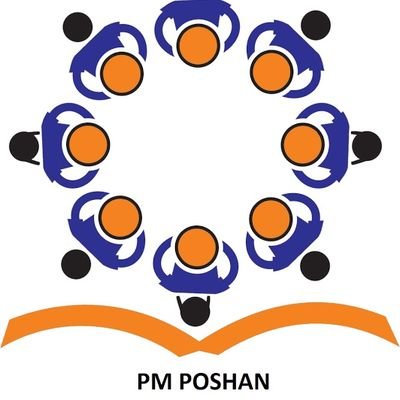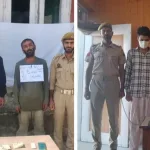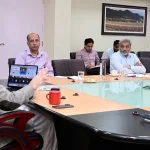Despite being one of India’s flagship initiatives aimed at improving malnutrition and enhancing school attendance, the PM POSHAN Scheme—formerly known as the Mid-Day Meal Scheme (MDMS)—is failing to meet its objectives in Srinagar’s government schools, raising serious concerns about the implementation and effectiveness of the program in the region.
Launched in 1995, the Mid-Day Meal Scheme was a groundbreaking initiative designed to provide free, hot cooked meals to children in pre-primary, primary, and middle schools, with the dual aim of addressing malnutrition and improving school attendance. The scheme promised to deliver 450 calories and 12 grams of protein to primary school students, and 700 calories and 20 grams of protein to those in upper primary classes. It was a vital factor in drawing children to government schools, with the meals seen as an incentive for both parents and students. However, in Srinagar, the scheme’s delivery has been fraught with delays, inconsistencies, and unmet promises, leaving many students without the promised nutritional support.
A myriad of issues have contributed to the ongoing failures. Reports from school officials, parents, and students paint a bleak picture. Delays in food supply, inconsistent fund transfers, and a severe lack of necessary cooking equipment have led to meals that fall drastically short of the nutritional standards set by the program. In many instances, students are left with nothing more than plain chapatis with salt or rice with minimal nutritional value—far from the wholesome meals they were promised.
“Sometimes we receive meals, and other times we don’t. The quality of the food is not very good—mostly, it’s just dal, chawal, and some vegetables. The meals often lack variety, and the portions are smaller than usual,” said Faizan, a student from a local government school.
Another student, Sehrish, shared a similar sentiment, stating, “Often, it’s the same food every day, and it doesn’t taste good. We used to get eggs sometimes, but now it’s rare.”
The frustration isn’t limited to the students alone. Parents are equally concerned about the scheme’s failure to deliver. Farzana, a concerned parent, expressed her worry: “As a parent, I worry about my child not getting the nutrition they need. The government promises these meals, but we see little consistency. Some days, my child comes home hungry.”
While the government is meant to provide rations every three months based on the grade levels of students, there have been frequent shortages in food supplies. Pre-primary and primary students are supposed to receive 100 grams of rice each, while middle-grade students are allotted 200 grams. However, schools across Srinagar have faced disruptions in the timely distribution of these rations, compounding the difficulties.
“We face frequent shortages, and the distribution of supplies isn’t consistent across all schools,” said a school official who wished to remain anonymous. “Many schools lack the necessary tools for large-scale meal preparation, such as stoves, utensils, and proper storage. Without adequate kitchen equipment, it’s difficult to prepare meals in the required quantity and quality,” the official added.
The lack of a standardized menu has only exacerbated the situation. “We don’t have a proper menu to follow, so we buy seasonal vegetables based on availability and cost. This leads to inconsistent meals, and children might not always get balanced, nutritious food,” explained another official.
Financial challenges have also played a significant role in the failure to provide quality meals. The cooks and helpers responsible for preparing the meals are severely underpaid. While they are supposed to receive a salary of around 1,000 rupees, many report receiving only 400 or 600 rupees. This has had a direct impact on both the morale of the workers and the quality of the meals. “We work hard, but the salary barely covers our basic needs. It feels discouraging when we do our best, but the resources are so limited,” said one cook.
Despite these ongoing challenges, the government continues to allocate funds for the scheme, with 90% of the funding coming from the central government and the remaining 10% covered by the UT administration. However, delays in fund transfers have resulted in further setbacks, leaving many schools unable to deliver the promised meals consistently.
Deputy Director of Planning for Samagra Shiksha, Bilal Rashid, acknowledged the difficulties and assured that efforts were being made to address them. “There is no shortage of food grains, and we are making every effort to ensure a consistent supply,” he said. Regarding the issue of equipment shortages, Rashid pointed to funding constraints, noting, “This challenge arises due to funding constraints. Utensils and equipment fall under Non-Recurring Funds, and the lengthy approval process causes delays. However, we are revising the funding system by implementing the SNA (Single Nodal Agency) approach, which will streamline the process and facilitate smoother funding from January-February.”
While the government insists that no food grains are in short supply, the reality on the ground tells a different story. Despite the scheme being a rights-based program under the National Food Security Act of 2013, which guarantees free meals for children up to the age of 14, the implementation in Srinagar has fallen far short of expectations.
The Mid-Day Meal Scheme, once hailed as a transformative initiative, has become a symbol of the inefficiencies and systemic issues plaguing public welfare programs. With inconsistent meal distribution, inadequate equipment, and a lack of financial and logistical support, the scheme is failing the children it was meant to serve.
As the government struggles to resolve these issues, the urgency of the situation cannot be overstated. Children’s nutrition and their right to quality education are at stake, and immediate action is needed to ensure that the PM POSHAN Scheme delivers on its promises.
The time for piecemeal solutions has passed. It is imperative that higher authorities step in to address the challenges with renewed commitment and swift action. Only then can we hope to fulfill the objectives of the PM POSHAN Scheme and restore its credibility as a tool for both educational improvement and nutritional security for children in Srinagar.








